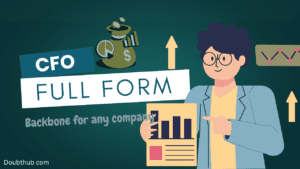Listen to a detailed podcast about Supply Chain Management only on doubthub.com
In today’s global market, efficiently delivering products and services is very important for the success of any business. That is why the concept of Supply Chain Management (SCM) plays a crucial role in every industry. But what is SCM, Process, etc
The main focus of SCM is that the entire process from raw materials to the final product is managed smoothly and cost-effectively.
If you want to understand the full form of SCM, its process, benefits, and its impact on businesses, then this article will be very helpful for you.
Table of Contents
What is the full form of SCM?
- Supply Chain Management
What is SCM ( Supply Chain Management )
This is a business strategy that optimizes the entire process from procurement of raw materials to final delivery so that both time and cost are saved and quality is also maintained.
Multiple stakeholders are involved in SCM such as suppliers, manufacturers, warehouses, transportation services, and retailers.
Why is SCM important?
- Cost Control – Proper supply chain management reduces manufacturing and logistics costs.
- Faster Delivery – Products reach the customer quickly and efficiently.
- Customer Satisfaction – A good supply chain system ensures timely delivery and high-quality products.
- Competitive Advantage – Strong SCM enables companies to take the lead in the market.
- Waste Reduction – The SCM process helps in reducing excess inventory and wastage.
Supply Chain Management Process (SCM Process )
SCM is a multi-step process that manages the entire system from planning to final delivery.
The SCM process is divided into 5 important steps:
1. Planning
- In this step, the supply chain strategy is designed.
- Demand forecasting is done.
- for production and distribution is set.
- Inventory and supplier selection is finalized.
2. Sourcing
- Raw materials or required components have to be sourced from the right suppliers.
- Best suppliers are selected.
- Price negotiation and contract signing is done.
- Quality check and compliance rules are taken care of.
3. Manufacturing
- All steps of manufacturing and production are executed here.
- Raw materials are used efficiently.
- Assembly, testing and packaging of products takes place.
- Quality control is maintained.
4. Logistics & Delivery
- Manufactured goods are delivered to warehouses and retailers.
- Transportation and logistics management takes place.
- Fast and cost-effective delivery is taken care of.
- Shipment is optimized according to customer demand.
5. Returns & Customer Support
- If the customer gets a defective product or has any other issue, then the return process should run smoothly.
- Product return policies are defined.
- Customer support and feedback system is developed.
- Data is analyzed for continuous improvement.
Read more What is HIV – Full form, causes, prevention & key facts!
Important Components of SCM
- Suppliers – who supply raw materials or components.
- Manufacturers – who produce the final product.
- Warehouses – where inventory is stored.
- Logistics Providers – who transport the goods.
- Retailers/Distributors – who deliver the final product to the customers.
Benefits of Supply Chain Management ( SCM Benefits )
Correct implementation of SCM is very beneficial for any business. Here are some major benefits:
- 1. Cost Reduction – Optimized supply chain reduces extra costs and wastage.
- 2. Customer Satisfaction – Fast delivery and high-quality products improve customer satisfaction level.
- 3. Business Growth – Efficient SCM makes business operations smooth and profitability increases.
- 4. Risk Management – Proper SCM can handle supply chain risks like delays, shortages and quality issues.
- 5. Competitive Edge – Companies that adopt efficient supply chain management take the lead in the market.
Supply Chain Management Challenges
There are many challenges in SCM, which businesses have to handle regularly:
- 1. Demand Uncertainty – Market trends are unpredictable, which can make supply chain planning complex.
- 2. Supply Chain Disruptions – Factors like natural disasters, political instability, and global crises can impact the supply chain.
- 3. High Transportation Costs – Increasing logistics and fuel costs put an extra financial burden on the supply chain.
- 4. Inventory Management Issues – If inventory becomes excessive or insufficient, business losses can occur.
Future Trends in Supply Chain Management
SCM is going to become even more advanced in the coming times, as new technologies and innovations are making the supply chain more efficient.
- 1. Artificial Intelligence (AI) & Automation – Demand forecasting and warehouse management is getting better through AI and machine learning.
- 2. Blockchain for Transparency – Blockchain technology helps in increasing transparency and security in the supply chain.
- 3. IoT (Internet of Things) – IoT-enabled sensors make real-time tracking and monitoring possible.
- 4. Green Supply Chain Initiatives – Companies are adopting eco-friendly supply chain solutions, such as electric transportation and sustainable packaging.
FAQ About SCM Full form
What is SCM?
The full form of SCM is Supply Chain Management. This is a process that manages the entire system from raw material to the final product reaching the customer.
What is the main purpose of SCM?
Its main purpose is to reduce cost, increase efficiency and deliver the correct product to the customers quickly.
How many main components are there in the supply chain?
There are 5 main components of SCM:
Planning ,Sourcing ,Manufacturing ,Delivery & Logistics ,Returns
What is the difference between SCM and Logistics?
SCM is a big process that manages everything from raw material to final delivery, while logistics focuses only on transportation and warehousing.
What is the role of technology in SCM?
Nowadays SCM has become even more efficient with the help of AI, IoT, Blockchain, and ERP software. This makes real-time tracking, automation, and error reduction possible.
How does the Just-in-Time (JIT) strategy work in SCM?
JIT is a strategy in which raw material or inventory is ordered only when it is needed. This reduces storage costs and also reduces waste.
In which industries are SCM very important?
SCM is important for every industry, but it is most used in Retail, E-commerce, Manufacturing, Pharma, FMCG and Automotive industries.
What is Green Supply Chain Management?
When eco-friendly practices are used in SCM such as sustainable sourcing, energy-efficient transportation, and recyclable packaging, then it is called Green SCM.
Which jobs are available in SCM?
If you want to make a career in SCM, then you can apply for roles like Logistics Manager, Supply Chain Analyst, Procurement Specialist, Inventory Manager, and Demand Planner.
Conclusion for Supply Chain Management Process
Supply Chain Management (SCM) is a key factor in the success of any business. If the SCM process is implemented correctly, then cost efficiency, fast delivery, and customer satisfaction can be achieved.
In the coming time, technologies like AI, blockchain, and IoT are going to make SCM even more powerful.
If you are a business owner or working in a supply chain, then proper implementation of SCM can take your business to a new level.
In this article, we explored the what is a SCM full form? and its significance in various contexts. Understanding such abbreviations not only enhances our knowledge but also helps in better communication. If you found this information helpful, feel free to explore more full forms on DoubtHub.com and expand your understanding. Stay informed, and keep learning with us!
![SCM Full Form [5 Critical Supply Chain Management Process]](https://doubthub.com/wp-content/uploads/2025/03/SCM-full-form-1.jpg)
![What is APR? [ Full Form, Shocking Facts 2025]](https://doubthub.com/wp-content/uploads/2025/03/APR-full-form-1-300x169.jpg)

